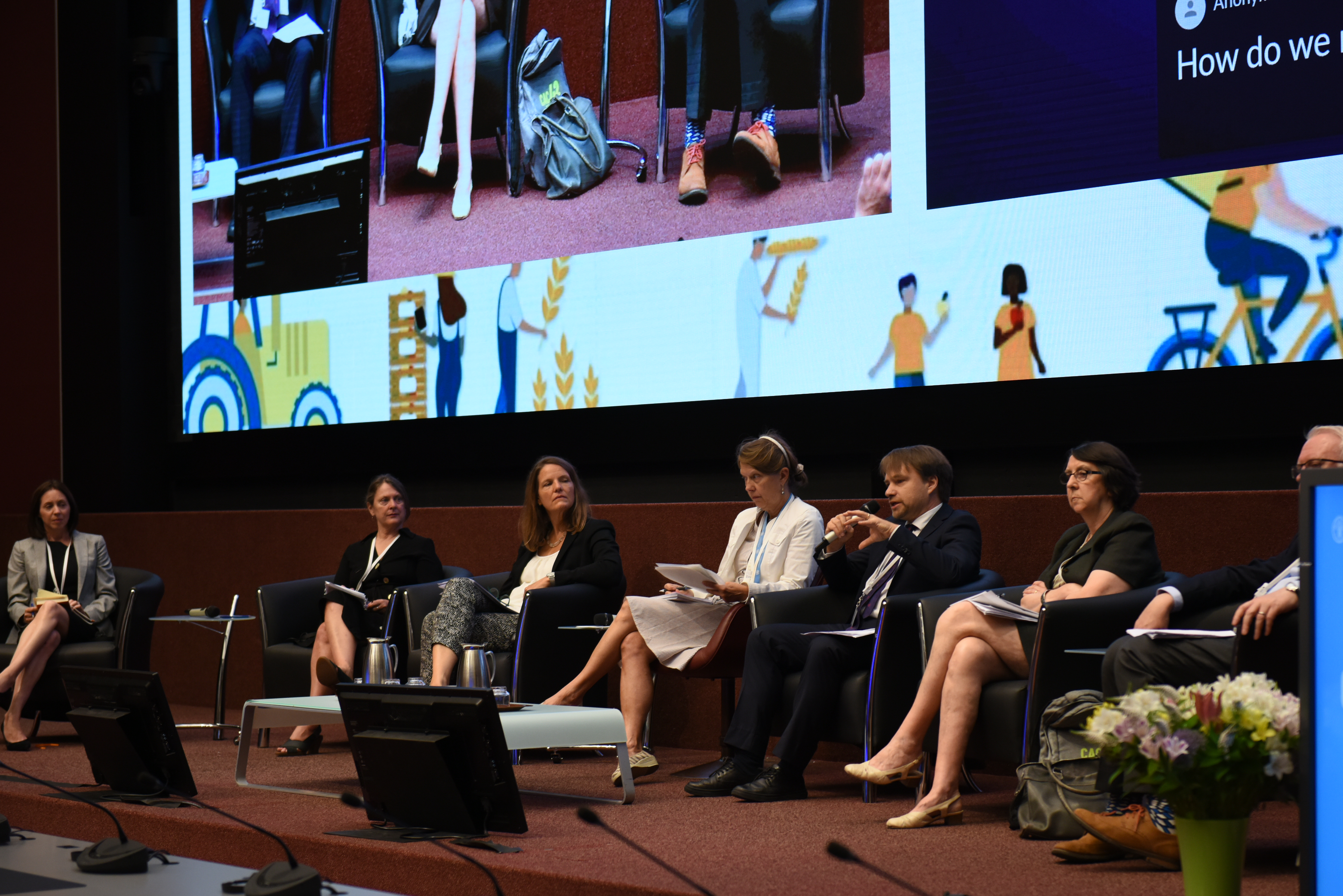Experts agree Codex can build trust in food sold online
International governmental and non-governmental organizations, taking advantage of the global interest generated by the International Food Safety Conference in Addis Ababa in February 2019, discussed the Future of Food and the role Codex can play when dealing with e-commerce, during an event held at the Codex Alimentarius Commission in Geneva on 11 July 2019.
Panellists discussed the challenges facing regulatory bodies and Codex as shopping online redirects the path our groceries take from farm to fork, offering consumers ever greater choice but potentially exposing them to new risks.

left to right: Nicola Bonnefoy, Kathy Twardek, Christiane Wolff, Stephanie Nebehay (Moderator), Luca Bucchini, Nicole Coutrelis, John Collins.
Luca Bucchini, vice-chairperson of the European Specialist Sports Nutrition Alliance said, “making safe and compliant food, including sports nutrition products, is not trivial, companies may lack the expertise for safety and compliance. From this perspective, platforms have been, so far, disappointing”.
Nicola Bonnefoy, Food Safety Manager at Food Industry Asia, said the main risks they identified with e-commerce were “ambiguity of regulations, ascertaining the authenticity of products sold online and … customs”.
📽 | Nicola Bonnefoy, #FoodSafety Manager, @FoodIndAsia identifies food safety risks and fraud relating to e-commerce#CodexCAC42 pic.twitter.com/H0zHTsCkkQ
— Codex Alimentarius (@FAOWHOCodex) 11 luglio 2019
John Collins is Executive Director of the International Fruit and Vegetable Juice Association. "Policy makers can facilitate internet sales by making sure that legislation covers this aspect and be vigilant on how these products are sold by also getting in touch with local trade organizations", he said.
Christiane Wolff from the World Trade Organization, highlighted the opportunities e-commerce can bring for small and medium enterprises who are able to link up directly with consumers. All imported food has to comply with food safety regulations “but enforcing that can be a challenge when instead of inspecting a boat or a container or a truck you have to look at all kinds of individual parcels that are coming into final consumers”, she said.
📽 | @ChristianeWolff @wto explains the opportunites and challenges that e-commerce presents and the importance of Codex in this arena #CodexCAC42 #wto #wtosps pic.twitter.com/PlntsWAQSA
— Codex Alimentarius (@FAOWHOCodex) 11 luglio 2019
As the world turns to new technologies it is imperative to identify regulatory solutions to food sold online. While a number of initiatives exist to tackle online fraud, Codex is well placed to coordinate efforts towards defining and harmonizing standards in this area.
Use of labelling, clear information and international standards developed by the Codex Alimentarius Commission, were identified by the panellists as a means to protecting consumer health while facilitating international food trade. Other advancements made in terms of traceability systems, blockchain, and electronic documentation can contribute to consumer trust, opening the door to new markets. Food safety is the priority for e-commerce and a risk-based approach that places controls on high-risk food products could help to ensure their overall safety.
Codex observers concluded that consumer trust is at the heart of the discussion on e-commerce and standards play a pivotal role in ensuring safe food for the different markets in the world.
When consumers shop online they need to have “the same confidence they have when shopping in supermarkets, and they should have the same level of information and protection”, said Bucchini.
Read more
Online buying and selling potential game changer for small-scale farmers
Categories
- (11)
- (3)
- Animal Feed (8)
- Antimicrobial Resistance (39)
- Antimicrobial Resistance (78)
- CAC46 (15)
- Codex Texts (20)
- Codex Trust Fund (1)
- Codex60 (19)
- Contaminants (13)
- Contaminants (10)
- COVID-19 (64)
- Elections (6)
- Food Safety (126)
- Labelling (10)
- Nutrition and Labelling (5)
- Nutrition and Labelling (7)
- Observers (23)
- Pesticides (7)
- Standards (78)
- World Food Safety Day (154)


